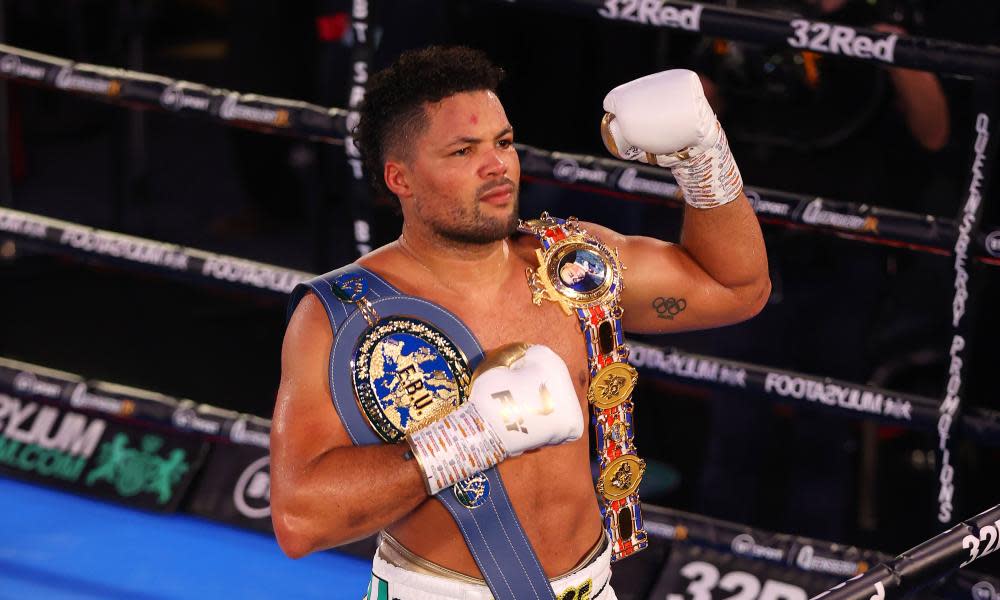Quiet man Joe Joyce scores points for boxing's integrity on night of hysteria

It’s always the quiet ones. And they don’t come a lot quieter than Joe Joyce, whose impressive if inconvenient stoppage of Daniel Dubois has hurled him into the heavyweight spotlight alongside Anthony Joshua and Tyson Fury, his compatriots who share all four world belts.
After making the 23-year-old Dubois quit in the 10th round at Church House on Saturday night – the British, Commonwealth and European champion taking a knee then pawing an eye injury that was confirmed on Sunday as a broken orbital bone, along with nerve damage – the best-case scenario for the 35-year-old south Londoner is a mandatory challenge for Joshua’s WBO title.
If Joshua – who defends his three belts against Kubrat Pulev on Saturday – becomes tangled up in talks with the idling WBC champion Fury for a putative two-fight bonanza in 2021 and has to give up the WBO title, Joyce would happily fight the unbeaten Oleksandr Usyk for the vacated championship.
Joyce will take it all in his stride, unnoticed almost by those in the business drawn to louder voices. In the hours after Joyce’s steady dismantling of Dubois, there was a noticeable absence of legitimate fighting in the exhibition “draw” between Mike Tyson and Roy Jones Jr but plenty of excited hype from people who ought to know better. For those who paid to watch that early-hours pretend fight: commiserations.
Related: Joe Joyce takes titles after forcing Daniel Dubois to quit in 10th round
The only heavyweight contest worthy of the name on Saturday was that between the likable but seriously dangerous Dubois and his equally amenable and deceptively threatening challenger. Both have a love of art (Joyce once committed Muhammad Ali to canvas, which few of Ali’s opponents managed), and neither is a fool.
There was no animus, no shouting, no pretence – but plenty of honesty as it quickly became obvious to the champion’s trainer, Martin Bowers, that this was “a real fight”. Dubois responded with encouraging heart after Joyce’s tree-trunk jab produced a purple swelling over his left eye that grew like a mushroom from the middle stages to the surprising end.
There was little between them when they began the 10th, the acknowledged start of the closing championship rounds, where hearts are broken and dreams realised. Midway through the round Dubois took another cracking blow to his wound, touched it with his glove and sank to his knee for a full count, as he looked imploringly towards his corner. This was the first moment of truth in his young career, and he decided the pain and the risk of serious injury did not warrant his continuing.
Experienced fighters ringside for BT Sport, including the former world champions Carl Frampton and David Haye, agreed he had quit. Technically he had. It would have been a better look if he had survived the round and let his trainer call the doctor before submission, but it probably was not an option that occurred to Dubois in that slow-motion moment.

In the immediate aftermath, however, attention remained focused on the loser, the concern for him overriding celebration for the winner, which was unfortunate and unfair. Dubois had been the favourite, the one who would forge on to bigger nights. Joyce was supposed to lend credibility to the exercise but had prevailed, and was now momentarily ignored in his proudest moment.
Dubois, who has genuine respect for his opponent, said: “He caught me with a good jab, the jab was pretty accurate. I couldn’t see out of the eye. It just happens, man, I can’t explain it … I couldn’t see out of it. I was trying my best.” When the microphone eventually swung Joyce’s way, he made a pertinent observation about the man he had just beaten: Dubois, he said, is about the age Joyce was when he began boxing. He smiled and wished him well on his journey.
Every now and again, the wisdom of the late Brendan Ingle returns to remind us: “You don’t play boxing.” What Tyson and Jones did at the Staples Center in Los Angeles was high-grade playing. Iron Mike, who had got himself into decent shape, expended more energy on keeping the handbrake on his left hook than throwing it with venom, while his smaller foe clung to him like an old friend after gassing as early as the third round. Their combined age was 105.
The real fight was in an historic building in the shadow of Westminster, a place where bombs landed in the blitz, where Churchill orchestrated the defence of the realm. Boxing is too dangerous an undertaking to play. It needs realists not fantasists. One out of two was not bad on Saturday night.

 Yahoo Movies
Yahoo Movies 
